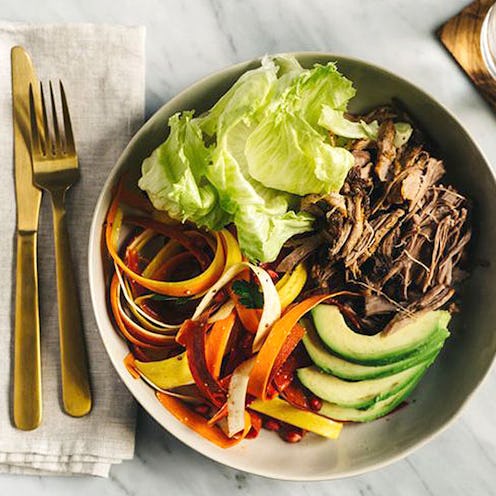(Beauty)
Can Going Paleo Make You Sick?

For Ryan Brady, switching to a Paleo Diet was a desperation move.
In college, she was diagnosed with Lyme disease, and a side effect was feeling seriously tired. Plus, despite already avoiding gluten and dairy, she was fighting bad inflammation. When her doctor recommended she go Paleo this past summer, it was a no-brainer—and Brady started filling up on greens and meat.
She didn’t, however, get the result she was expecting. “I did have more energy and slept better, but I started having so many digestive problems,” says Brady (who’s now Well+Good’s marketing and events coordinator). “I was bloated all the time and had gas pains—my stomach felt really blown up. I was miserable.” Still, she stuck with it, thinking maybe it was just the transition and that her body would eventually embrace her new Paleo eating habits. But a month later, she was still having major issues.
“I put all my eggs in the Paleo basket and thought it was the solution, but ultimately, it was still a way for me to not look at the stress in my life.”
Frustrated, she called her cousin, who was in grad school to become a nutritionist, Brady explains. “She went Paleo and actually experienced the same exact symptoms as me. My cousin told me to start adding rice and some other non-Paleo foods back into my diet—and honestly, the day I did, I immediately felt better.”
Brady and her cousin aren’t the only people who have experienced digestive distress after nixing grains, legumes, and other simple staples. Emotional and disordered eating coach and Kundalini Yoga teacher Ashlee Davis experienced something similar—despite having studied nutrition and knowing the Paleo Diet can and does work for many people.
Why is the Paleo Diet so successful for some people and not for others? Keep reading for three way it can make you sick, or check our the original article on Well + Good.
Three Ways Going Paleo Can Make You Sick
1. You’re eating too many raw veggies
First things first: Going Paleo can be awesome for a lot of people. “The Paleo Diet is healthy and can really show people how carbs, sugar, and processed foods negatively impact the body,” Davis says.
The problem? An overnight switch to mostly raw vegetables and meat (which is healthier but harder for the body to process) can overload the digestive system, something Davis has seen in several of her clients. Her tip: Ease into it with softer, cooked vegetables—like sweet potatoes—instead of filling up on raw salads every meal.
2. You’re eating healthy foods that just don’t agree with your body
But what if, like Brady experienced, the transition isn’t the problem? “You still have to be mindful about what you’re putting in your body,” Davis says. “Some people on the Paleo Diet might not eat eggs because they irritate their stomach. Other people may eat a lot of eggs and fish, but it’s red meat that’s difficult on their digestive system. You still have to notice how what you put into your body affects you—that’s true of any eating plan.”
After all, if there was one perfect diet that worked for everyone, gut health wouldn’t be such a trending topic. Davis says the key is taking the time to pinpoint which foods don’t agree with your body; once you figure out your triggers, you can modify your diet so you’re still eating Paleo—with a few tweaks.
For all three reasons check out the full article here on Well + Good.